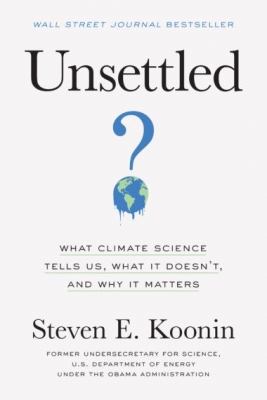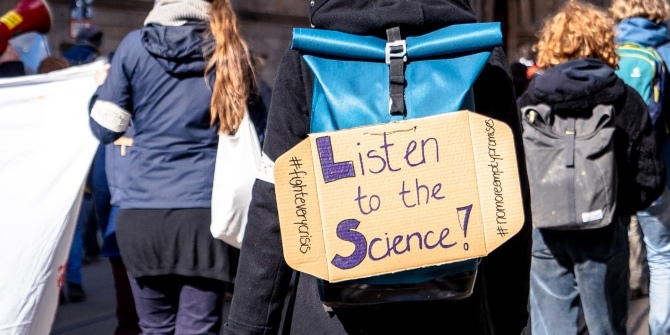In Unsettled: What Climate Science Tells Us, What It Doesn’t, and Why It Matters, Steve Koonin sets out his scepticism about the science of climate change, arguing that increasing global temperatures could be down to natural variability rather than human activities. Bob Ward finds that the book is not a robust guide to the subject and is based on a number of inaccurate and misleading claims, flawed studies, and cherrypicked information.
 Unsettled: What Climate Science Tells Us, What It Doesn’t, and Why It Matters. Steve Koonin. BenBella Books. 2021.
Unsettled: What Climate Science Tells Us, What It Doesn’t, and Why It Matters. Steve Koonin. BenBella Books. 2021.
A new book, ‘Unsettled: What Climate Science Tells Us, What It Doesn’t, and Why It Matters’ has been seized upon by American opponents of climate change action. But climate scientists have condemned it as little more than propaganda.
The author, Professor Steve Koonin, trained as a theoretical physicist and left his job as chief scientist at BP to take up the role of Under Secretary for Science in the US Department of Energy in May 2009. He left the Obama Administration in November 2011 and became Director of the Center for Urban Science and Progress at New York University. Shortly afterwards he started to publicly express his scepticism about the science of climate change, particularly through a long article under the headline ‘Climate Science Is Not Settled’ in ‘The Wall Street Journal’ in September 2014.
As Koonin admits in the introduction, his book is an updated and extended version of his newspaper article. Some of the early chapters are interesting and informative on how greenhouse gas concentrations and global temperature have changed. But most of the book is drenched in the author’s sense of self-importance, with Professor Koonin clearly believing that the global community of climate scientists are hiding some important facts and he alone speaks the truth.
For instance, in the introduction, he writes: “As a scientist, I felt the scientific community was letting the public down by not telling the whole truth plainly. And as a citizen, I was concerned that the public and political debates were being misinformed. So I began to speak out…It seems that by highlighting those uncertainties so plainly and publicly, I had inadvertently broken some code of silence, like the Mafia’s omerta.”
Professor Koonin argues that many of the consequences that have been attributed to the undeniable rise in atmospheric concentrations of carbon dioxide and other greenhouse gases, including the rise in global mean surface temperature, could be due instead to natural variability. He alleges that climate science is “broken”, and argues that human society should focus on adapting to the potential impacts of climate change instead of seeking to prevent them by ending annual emissions of greenhouse gases.
The author recommends that readers act warily by “checking up on what you’ve read in the media by looking at the primary research cited”. This is good advice. Fact-checking Professor Koonin’s claims leads the reader to realise how he has cherrypicked and carelessly misrepresented many of his sources.
For instance, in one chapter on “Tempest Terrors”, Professor Koonin attacks media coverage of the link between climate change and tropical cyclone activity, alleging that it “continues to promulgate unsupported alarm”. He cites a journal paper on ‘Global increase in major tropical cyclone exceedance probability over the past four decades’, and refers to a report on it in the newspaper ‘USA Today’, which summarised the conclusions as: “Human-caused global warming has strengthened the wind speeds of hurricanes, typhoons and cyclones around the globe”.

Photo by Mika Baumeister on Unsplash
To justify his complaint, Professor Koonin draws attention to the following quote from the final paragraph of the journal paper: “Ultimately, there are many factors that contribute to the characteristics and observed changes in TC [tropical cyclone] intensity, and this work makes no attempt to formally disentangle all of these factors. In particular, the significant trends identified in this empirical study do not constitute a traditional formal detection, and cannot precisely quantify the contribution from anthropogenic factors.”
However, Professor Koonin omits the sentence that followed: “From a storyline, balance-of-evidence, or Type-II error avoidance perspective, the consistency of the trends identified here with expectations based on physical understanding and greenhouse warming simulations increases confidence that TCs have become substantially stronger, and that there is a likely human fingerprint on this increase.”
Similarly, Professor Koonin complains about the following statement from a speech in September 2015 by the then Governor of the Bank of England, Mark Carney: “Despite winter 2014 being England’s wettest since the time of King George III; forecasts suggest we can expect at least a further 10% increase in rainfall during future winters.”
Professor Koonin writes: “To support that assertion, he cited Britain’s Met Office ‘research into climate observations, projections, and impacts.’ These were model forecasts for the next five years, so you might expect they’d be more accurate than those attempting to project climate fifty years out”. He concludes that “the Met Office models Carney cited back in 2014 all turned out to be dead wrong”. This was simply false. Mr Carney was referring accurately to projections for the 2080s, not over the next five years.
The inaccurate and misleading claims in the book are not limited to the science and include the economics of climate change. For instance, Professor Koonin states that “many analyses suggest that a warming of less than 2ºC is likely to have a small net positive economic impact, thanks to improved agricultural conditions and reduced heating costs in the temperate northern latitudes”. But he cites a flawed study that actually found just a single outlier paper suggesting net positive economic impacts from a warming of less than 2°C.
Overall, ‘Unsettled’ is a perfect embodiment of the strategy recommended in a cynical memo by pollster Frank Luntz to Republican activists during the Presidency of George W. Bush: “Should the public come to believe that the scientific issues are settled, their views about global warming will change accordingly. Therefore, you need to continue to make the lack of scientific certainty a primary issue in the debate”.
Predictably, Professor Koonin’s unreliable account of the facts about climate change has been panned by many researchers. Equally predictably, the book has received glowing reviews from conservative climate change deniers in the United States and abroad. Professor Koonin has accepted an invitation to follow in the footsteps of other male “experts”, such as Cardinal George Pell and former Australian Prime Minister Tony Abbott, by delivering the annual lecture for the Global Warming Policy Foundation, the UK lobby group.
However, the publication in August 2021 of a new assessment of the science by the Intergovernmental Panel on Climate Change, the world’s most authoritative source on the subject, shows very clearly that Professor Koonin’s book is not a robust guide to the subject.
Please read our comments policy before commenting.
Note: This article gives the views of the author, and not the position of USAPP – American Politics and Policy, nor of the London School of Economics.
Shortened URL for this post: https://bit.ly/3iKMJet
About the reviewer
Bob Ward – LSE Grantham Research Institute on Climate Change and the Environment
Bob Ward is policy and communications director at the Grantham Research Institute on Climate Change and the Environment at the London School of Economics and Political Science.



RE: Book Review: Unsettled: What Climate Science Tells Us, What It Doesn’t, and Why It Matters by Steve Koonin
Hello
Could you please explain why in the above article there is a pejorative reference to “male experts” regarding climate- on what scientific basis do you propose that one’s expertise on a matter is reduced through possessing male gender? I have shared your articles with friends, family and work colleagues and the response to poor journalism has not been favourable. I look forward to your reply.
Sincerely.
Doug McIntyre
I’m reading Koonin’s book now, and some of the criticisms in this and other reviews did ring alarms, indeed. This particular review was doing a fine job until the “…other male experts” jab, sadly destroying the whole apparent legitimacy of the review. The last thing we need in this already tensely debated topic is the interference of wokism to judge a scientist credibility. In all fairness I can’t share this otherwise useful review due to this unnecessary flaw, disclosing the biased motivation of the writer.
Two points. The first is, there is no reference to 2080’s as a projection date in Mark Carney’s speech that I could find. What page is it on?
Secondly, Mark Carney did say that sea levels at The Battery, New York have risen 8 inches over the last 71 years. Really? Where did he get that figure from?
Maybe I should read Professor Koonin’s book..
to Roger Bellamy
You claim “there is no reference to 2080’s as a projection date in Mark Carney’s speech that I could find. What page is it on?”
If you follow footnote 14 (page 7 of his speech) you will find the Met Office paper, with 10% additional UK rainfall projections to 2100 included in it (on pages 66 – 67), which matches Mark Carney’s comments in the speech. The link, in the speech, to the Met Office paper seems to be broken currently, but I did a google search to find the relevant Met Office paper. The paper can be found independently at:
https://www.metoffice.gov.uk/binaries/content/assets/metofficegovuk/pdf/research/climate-science/climate-observations-projections-and-impacts/uk.pdf
You describe Koonin as “trained” in theoretical physics. He was a professor of physics at Cal Tech, and then provost there.
Yet Steven Koonin quotes the IPCC many times in his 2021 GWPF lecture.
Roger Pielke, Jr., Professor of Environmental Studies at the University of Colorado and Distinguished Fellow of Japan’s Institute of Energy Economics – does not argue against anthropogenic effects on climate but does argue that dramatic climate events like hurricanes and floods have not changed significantly in frequency or intensity since the early 20thC. https://www.youtube.com/watch?v=uFOzhXxVSxA
Manhattan is actually sinking due to the extraordinary vertical masses built upon the mantle there. It is not a place of certainty in terms of ocean levels. The data using Manhattan therefore of ocean levels means nothing.
I’ve now bought Prof Koonin’s book. I was hoping he’d read enough of the papers that I wouldn’t have to. It seems that this may be a forlorn hope.
Is there any hope that he, Willie Soons, James Hansen and Michael Mann would ever get together and debate the matter in public or would it just collapse into acrimony? Two are more sceptical a) that it’s all man-made b) that we can do anything ‘world-changing’ about it.
To be fair, scientists worth their salt don’t get acrimonious in a public forum. They usually speak in barely-disguised code if they think someone else’s methodology was flawed, whether accidentally (incompetent) or deliberately (worse).
I have a colleague, not a ‘full’ scientist, who seems to have latched onto Hansen as a ‘trusted source’. However, Hansen is conveying a far more alarmist message than Soons or Koonin.